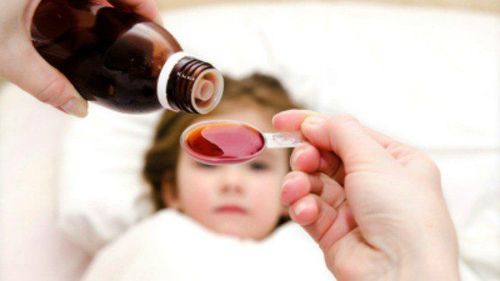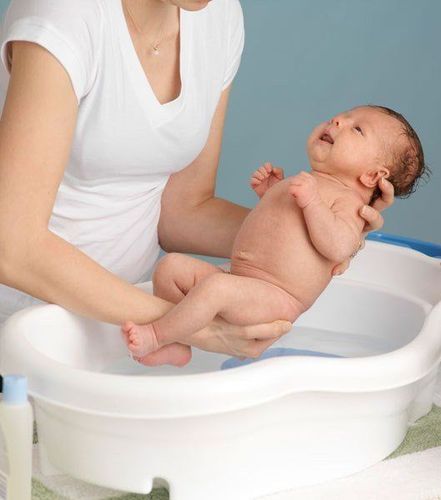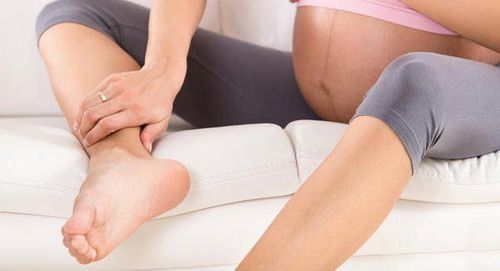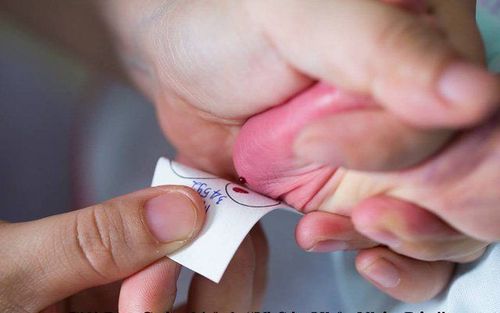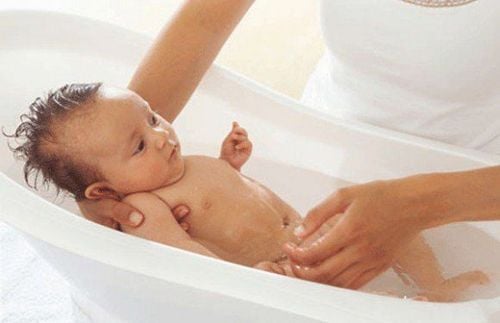This is an automatically translated article.
This article is professionally consulted by Master, Doctor Vu Quoc Anh - Pediatrician - Pediatrics - Neonatology Department - Vinmec Danang International General Hospital.Although bathing a baby seems like a pretty simple thing, how to bathe a newborn for the first time will confuse many parents. Therefore, almost all first-time parents are concerned with instructions on how to properly bathe their babies.
1. Wipe yourself for babies
1.1. Preparation For infant safety reasons, your baby's first bath is practically a process of being cleaned with an absorbent washcloth. Parents should do this in a warm enough space with a flat surface lined with a thick towel, be it in the bathroom or on the kitchen counter, changing table or bed. If using air conditioning or in places with cold weather, make sure the room temperature is at least 26 degrees Celsius or higher because babies are very cold.
Prepare in advance all necessary items to clean the baby's body, including:
Absorbent soft towels; Clean and dry towels, or baby bathrobes; A new diaper; Clean clothes; Vaseline and gauze (for circumcised boys); Warm water;
1.2. Instructions for Bathing Newborns with a Towel Gently wiping your baby's body with a towel is essential during the first few weeks after birth, until the umbilical cord falls off and/or the circumcised foreskin has completely healed. How to bathe a newborn in the first weeks is as follows:
First, undress your baby and support the head with one hand. Keep diapers as this is the area that will be cleaned last. Wrap your baby in a towel, exposing only the parts that need to be cleaned. Use baby wipes to clean each spot, top to bottom and front to back. Start behind the ears, then work your way to your neck, elbows, knees, and between your fingers and toes. Pay attention to the creases under the arms, behind the ears, and around the neck. After cleaning the above areas, move to the top of the hair to avoid making the baby cold for a long time. Because babies usually don't have a lot of hair, parents don't need to use shampoo, just use water. To avoid wetting the baby's eyes, tilt the baby's head slightly back. Next is the time to remove the diaper to clean the baby's belly and genitals. For girls, wipe gently from front to back. If there's a little bit of vaginal discharge, there's no need to wipe it all off too thoroughly. In uncircumcised boys, only gentle external cleaning is required. If the baby is circumcised, absolutely do not wash the tip of the penis until the skin has completely healed. Finally, dry the whole baby's body by absorbing water with a soft towel, avoiding rubbing that irritates the delicate skin of babies. After completing the above steps, parents can change a new diaper and put on a clean set of clothes for the baby.
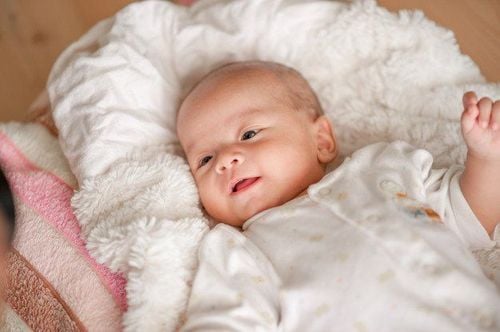
2. Bathe your baby in a basin/bath of water
2.1. Preparation Newborns will begin an actual bath/bath attempt when the umbilical cord has fallen off and the umbilicus and foreskin have completely healed. Many babies will cry during this first water bath. Therefore, if this is the case, parents can continue to clean the baby's body with a washcloth for about 1 week before trying to bathe again. Bathing a newborn for the first time is a process that requires a cooperative attitude and patience from the parents.
Newborns do not need to bathe every day, but instead, a reasonable frequency of bathing is 2-3 times/week. The small tub that fits the baby's body also makes it easier for parents to handle slippery situations if they happen. To prepare, parents can buy:
Baby bathtub made of thick plastic, sized to fit the child's body. (Required) Support pad keeps baby's head and body safe in water. Anti-slip mat, fixing the basin/bathroom. Do not purchase and use unnecessary and inappropriate accessories for babies, such as bath floats, bathroom toys, etc.
2.2. How to bathe a newborn in a basin of water Fill the bath with about 2 - 3 cm of warm water. Use one hand to support the baby's head, then slowly lower. Use baby wipes to wipe face and hair. When cleaning, cover the baby's forehead with your hand to protect it, to avoid getting water into the eyes. Clean the rest of the child's body with water and a small amount of soap. Use only mild baby bath products. For babies with thick hair, you can gently shampoo the baby by placing the parents' hands under warm water and then rubbing it on the baby's head. Apply a small amount of baby shampoo to your baby's hair. Gently massage in a circular motion, then use a plastic cup or hand to rinse off the shampoo. Keep the baby's head tilted back so the shampoo doesn't get into the eyes. Regularly use your hands to sprinkle a little water over the baby's chest area to keep him warm during the bath. Then gently pat the baby dry, a layer of moisturizing lotion prescribed by the doctor can be applied when the baby's skin is dry. Finally, change to a new diaper. If your baby's skin is irritated, consult your doctor about the right protective ointment. After just taking a bath, parents need to pay attention to wrap the baby in a towel immediately, especially pay attention to cover the head to keep the baby warm as soon as possible. Never leave an infant alone in the bath, even for a very short time. If parents have to answer the phone, turn off the stove or do any other action in the middle, always wrap the baby in a towel and bring him with him.
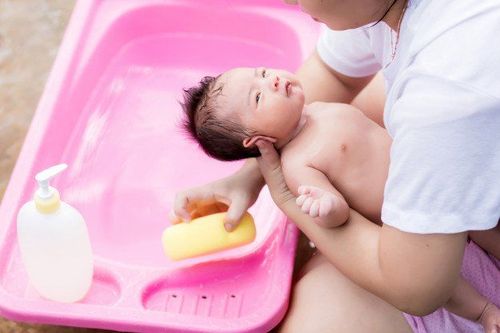
3. Notes in bathing babies
In addition to understanding and following the instructions for bathing babies as above, parents should also note the following points:
Gather all the necessary items before starting to bathe to avoid having to leave midway, infants can sink, choke, or slip very quickly. Placing towels, diapers and baby clothes near the bathing area to quickly put them on after bathing or cleaning can shorten the time and limit your baby's cold. Test the water temperature with your elbow, make sure it's warm (about 37 - 38 degrees Celsius) before bathing your baby. Use a wet washcloth, gauze or cotton ball to wipe away secretions from the eyes and nose, as well as the area around the mouth that is often contaminated with milk and drool. Pay careful attention when lifting the baby out of the tub/bath, use your hands to support the baby's head and neck as well as find a firm support for parents. Bathing before bedtime will help your baby sleep better. In addition, parents can also bathe the newborn at any time that feels convenient, but it should be fixed to form a habit for the child. Like all the other "firsts" coming up in the years to come, your baby's first bath is also a special event. Besides knowing the instructions for bathing babies, parents should cuddle, sing or talk to their babies while they are bathing because babies will feel more connected to their parents. Adhering to the right way of bathing a newborn baby also brings many benefits, such as helping the baby's senses to thrive when water or parents' hands gently touch all over the baby's body.
As a key area of Vinmec Health system, Pediatrics Department always brings satisfaction to customers and is highly appreciated by industry experts with:
Gathering a team of top doctors and nurses in Pediatrics : consists of leading experts with high professional qualifications (professors, associate professors, doctorates, masters), experienced, worked at major hospitals such as Bach Mai, 108.. Doctors All doctors are well-trained, professional, conscientious, knowledgeable about young psychology. Besides domestic pediatricians, the Department of Pediatrics also has the participation of foreign experts (Japan, Singapore, Australia, USA) who are always pioneers in applying the latest and most effective treatment regimens. . Comprehensive services: In the field of Pediatrics, Vinmec provides a series of continuous medical examination and treatment services from Newborn to Pediatric and Vaccine,... according to international standards to help parents take care of their baby's health from birth to childhood. from birth to adulthood Specialized techniques: Vinmec has successfully deployed many specialized techniques to make the treatment of difficult diseases in Pediatrics more effective: neurosurgery - skull surgery, stem cell transplantation. blood in cancer treatment. Professional care: In addition to understanding children's psychology, Vinmec also pays special attention to the children's play space, helping them to have fun and get used to the hospital's environment, cooperate in treatment, improve the efficiency of medical treatment. Master. Dr. Vu Quoc Anh has nearly 10 years of experience as a resident doctor and treating doctor at Hue Central Hospital and Danang Children's Hospital. Currently, he is a Pediatrician - Vinmec Da Nang International General Hospital.
Please dial HOTLINE for more information or register for an appointment HERE. Download MyVinmec app to make appointments faster and to manage your bookings easily.
Article referenced source: Webmd.com




